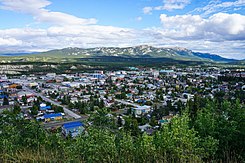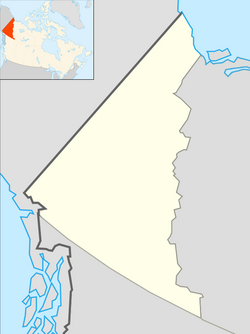
Back Whitehorse Afrikaans وايت هورس (يوكون) Arabic وايت هورس , يوكون ARZ Whitehorse AST Vaythors Azerbaijani وایتهورس AZB Уайтхорс Byelorussian Уайтхорс Bulgarian হোয়াইটহর্স, ইউকন Bengali/Bangla Whitehorse Catalan
Whitehorse | |
|---|---|
| City of Whitehorse | |
From top to bottom; left to right: View of Central Whitehorse in 2019, northern lights viewed from Riverdale, buildings in Downtown Whitehorse, Yukon Legislative Building | |
|
| |
| Nicknames: | |
| Motto(s): Our People, Our Strength | |
| Coordinates: 60°43′27″N 135°03′22″W / 60.72417°N 135.05611°W[2] | |
| Country | Canada |
| Territory | Yukon |
| Established | 1898 |
| Government | |
| • Mayor | Laura Cabott |
| • Governing body | Whitehorse City Council |
| • MPs | Brendan Hanley |
| • MLAs | Nils Clarke Yvonne Clarke Currie Dixon Scott Kent Jeanie McLean Tracy-Anne McPhee Richard Mostyn Ranj Pillai Elaine Taylor Lane Tredger Kate White |
| Area | |
| • City | 416.54 km2 (160.83 sq mi) |
| • Urban | 34.95 km2 (13.49 sq mi) |
| • Metro | 8,488.91 km2 (3,277.59 sq mi) |
| Elevation | 670–1,702 m (2,200–5,584 ft) |
| Population (2021) | |
| • City | 28,201 |
| • Density | 60.2/km2 (156/sq mi) |
| • Urban | 21,732 |
| • Urban density | 621/km2 (1,610/sq mi) |
| Demonym | Whitehorser[3] |
| Time zone | UTC−07:00 (MST) |
| Forward sortation area | |
| Area code | 867 |
| NTS Map | 105D11 Whitehorse |
| Website | whitehorse |
Whitehorse (French pronunciation: [wajtɔʁs]) is the capital of the Yukon, and the largest city in Northern Canada. It was incorporated in 1950 and is located at kilometre 1426 (Historic Mile 918) on the Alaska Highway in southern Yukon. Whitehorse's downtown and Riverdale areas occupy both shores of the Yukon River, which rises in British Columbia and meets the Bering Sea in Alaska. The city was named after the White Horse Rapids for their resemblance to the mane of a white horse, near Miles Canyon, before the river was dammed.
Because of the city's location in the Whitehorse valley and relative proximity to the Pacific Ocean, the climate is milder than comparable northern communities such as Yellowknife.[4] At this latitude, winter days are short and summer days have up to about 19 hours of daylight.[5][6] Whitehorse, as reported by Guinness World Records, is the city with the least air pollution in the world.[7]
As of the 2021 Canadian census, the population was 28,201[8] within city boundaries and 31,913[9] in the census agglomeration. These figures represent approximately 70 and 79 percent, respectively, of the entire population of Yukon.[10]
- ^ "About Whitehorse – Whitehorse, YT". www.city.whitehorse.yk.ca. Archived from the original on 2016-05-05. Retrieved 2015-10-21.
- ^ "Whitehorse". Geographical Names Data Base. Natural Resources Canada. Retrieved 15 August 2021.
- ^ "Demonyms—From coast to coast to coast – Language articles – Language Portal of Canada". Archived from the original on 2014-08-30. Retrieved 2014-08-24.
- ^ Pinard, Jean-Paul (September 2007). "Wind Climate of the Whitehorse Area" (PDF). Arctic. 60 (3): 227–237. doi:10.14430/arctic215. Archived from the original (PDF) on 2017-08-10. Retrieved 2017-10-25.
- ^ "Sunrise and sunset times in Whitehorse, June 2018". www.timeanddate.com.
- ^ "Whitehorse". The Canadian Encyclopedia. Archived from the original on 2011-08-14. Retrieved 2011-03-25.
- ^ Guinness World Records 2013, Page 036 (Hardcover edition). ISBN 9781904994879
- ^ "Census Profile, 2021 Census – Whitehorse, City [Census subdivision], Yukon and Yukon, Territory [Census division], Yukon". www12.statcan.gc.ca. Statistics Canada-Government of Canada. 30 January 2022.
- ^ "Census Profile, 2021 Census – Population and dwelling counts: Canada, provinces and territories, census metropolitan areas and census agglomerations". www12.statcan.gc.ca. Statistics Canada-Government of Canada. 13 February 2022.
- ^ "Yukon Population 2023". worldpopulationreview.com. Retrieved 2023-07-23.
© MMXXIII Rich X Search. We shall prevail. All rights reserved. Rich X Search








